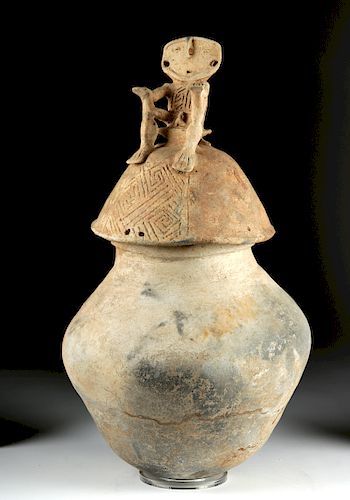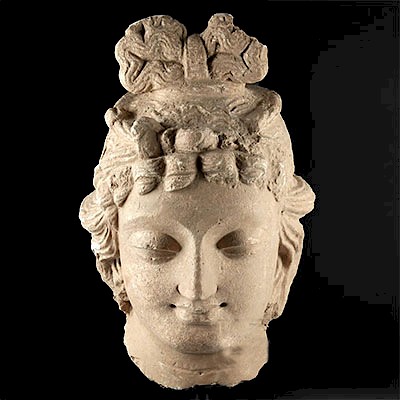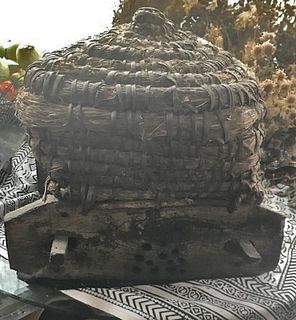Rio Magdalena Urn w/ Figural Lid -ex-Hollywood, TL Test
Lot 170
About Seller
Artemis Gallery
686 S Taylor Ave, Ste 106
Louisville, CO 80027
United States
Selling antiquities, ancient and ethnographic art online since 1993, Artemis Gallery specializes in Classical Antiquities (Egyptian, Greek, Roman, Near Eastern), Asian, Pre-Columbian, African / Tribal / Oceanographic art. Our extensive inventory includes pottery, stone, metal, wood, glass and textil...Read more
Estimate:
$3,800 - $5,700
Absentee vs Live bid
Two ways to bid:
- Leave a max absentee bid and the platform will bid on your behalf up to your maximum bid during the live auction.
- Bid live during the auction and your bids will be submitted real-time to the auctioneer.
Bid Increments
| Price | Bid Increment |
|---|---|
| $0 | $25 |
| $300 | $50 |
| $1,000 | $100 |
| $2,000 | $250 |
| $5,000 | $500 |
| $10,000 | $1,000 |
| $20,000 | $2,500 |
| $50,000 | $5,000 |
| $100,000 | $10,000 |
| $200,000 | $20,000 |
About Auction
By Artemis Gallery
Aug 30, 2018
Set Reminder
2018-08-30 10:00:00
2018-08-30 10:00:00
America/New_York
Bidsquare
Bidsquare : Fine Antiquities / Asian / Ethnographic Art
https://www.bidsquare.com/auctions/artemis-gallery/fine-antiquities-asian-ethnographic-art-3402
Featuring classical antiquities, Asian, ancient and ethnographic art from cultures encompassing the globe, plus fine art. Artemis Gallery info@artemisgallery.com
Featuring classical antiquities, Asian, ancient and ethnographic art from cultures encompassing the globe, plus fine art. Artemis Gallery info@artemisgallery.com
- Lot Description
Pre-Columbian, Colombia, Middle Magdalena, ca. 1000 to 1500 CE. A monumental male effigy lidded burial urn, meticulously handbuilt via the coiling technique, created to hold skeletal remains of a cherished ancestor. The lid presents a cazique sitting on a raised throne with hands on knees of his outspread legs, revealing his genitalia, presenting a somewhat emaciated body that is extensively decorated with incised geometric motifs on the chest and back (including the back of his head), and a seemingly entranced visage delineated with coffee bean shaped eyes, a hooked openwork nose ideal for decorating with a nose ring, a petite mouth that is slightly open as if chanting or singing, and openwork ears also ready for suspending earrings. Below the figure, on both front and back are panels of elaborate incised rectilinear geometric motifs that complement the designs on the cazique's body. Size: 15.5" W x 26" H (39.4 cm x 66 cm)
In the valley of the River Magdalena, ancient rituals related to the preparation of the body of the deceased for its journey to the afterlife involved the practice of secondary burials in urns like this example. According to the curatorial department of the Museo del Oro Banco de la Republica, "There are two different stages in the secondary burial funerary custom: first of all a primary burial takes place, where the corpse is buried for a certain period of time established in the ritual, and then after this, it is exhumed for burial once more in an urn, possibly amidst a great collective ceremony. Urns have been found in well tombs with side chamber, with certain local and regional variations. The chambers contain between three and seventy urns, each holding charred bone remains, large fractured bones, and fragments of skull. Each is accompanied by pots, bowls and goblets, most of which were made exclusively for the dead person, for they show no signs of having been used. Spindle whorls, rollers and axes have also been found."
Scholars argue that the custom of creating burial urns is related to the association of bones with the afterlife. According to Armand Labbe's "Colombia Before Columbus," "There is a widespread belief among many Indians of both Middle and South America that bones are a form of seed, from which new life will spring. Recall the Mexican allegory of the personification of the dual lifeforce, Quetzalcoatl, descending to the underworld to retrieve the bones of mankind to resurrect them to a new life." Labbe continues, "Within the Colombian context, the act of placing bones in cylindrical, phalliform urns, and placing these in the womb-like shaft-and-chamber tomb within the Earth Mother, seems to be an enactment of such beliefs." (Labbe, "Colombia Before Columbus: The People, Culture, and Ceramic Art of Prehispanic Colombia." (1986) New York: Rizzoli, p. 116)
For similar examples, see Armand Labbe, "Colombia Before Columbus: The People, Culture, and Ceramic Art of Prehispanic Colombia." (1986) New York: Rizzoli, p. 118, figures 104 and 105.
This piece has been tested using thermoluminescence (TL) and has been found to be ancient and of the period stated. A full report will accompany purchase.
Provenance: private Hawaii, USA collection; ex-private T. Misenhimer collection, Hollywood, California, USA, famous Hollywood film producer
All items legal to buy/sell under U.S. Statute covering cultural patrimony Code 2600, CHAPTER 14, and are guaranteed to be as described or your money back.
A Certificate of Authenticity will accompany all winning bids.
We ship worldwide and handle all shipping in-house for your convenience.
#132669Lid repaired from multiple pieces; normal surface wear commensurate with age. Figure's arms and legs show signs of repair. Phalliform urn is intact, which is quite unusual. Nice manganese deposits, firing clouds, and root marks.Condition
- Shipping Info
-
All shipping is handled in-house for your convenience. Your invoice from Artemis Gallery will include shipping calculation instructions. If in doubt, please inquire BEFORE bidding for estimated shipping costs for individual items.
-
- Buyer's Premium



 EUR
EUR CAD
CAD AUD
AUD GBP
GBP MXN
MXN HKD
HKD CNY
CNY MYR
MYR SEK
SEK SGD
SGD CHF
CHF THB
THB


















